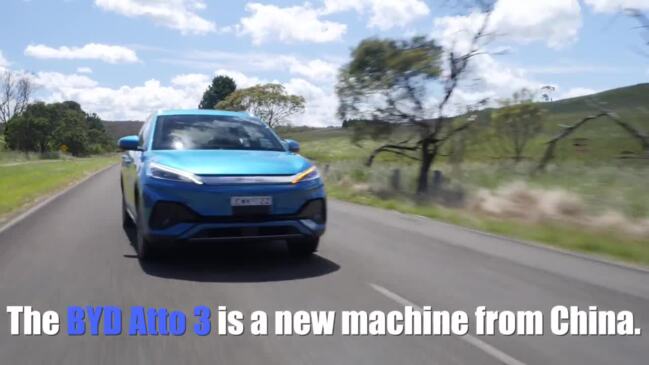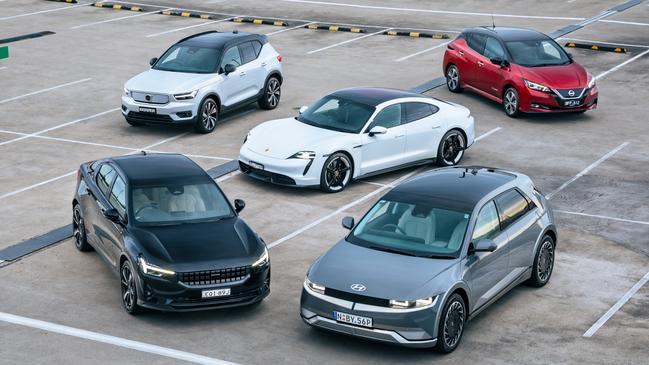Australia lags on electric vehicle sales, new figures show
Global sales of electric vehicles have surged, with China leading the way. Growth was strong locally but Australia is still well behind Europe and the US.

Motoring News
Don't miss out on the headlines from Motoring News. Followed categories will be added to My News.
New figures show that Australia still lags well behind the rest of the world in take-up of electric vehicles, despite explosive growth in the past 12 months.
Research data out of Germany indicates electric vehicles made up roughly 10 per cent of global vehicle sales last year.
Researchers LMC Automotive estimate that 7.8 million EVs were sold, thanks to booming popularity in China, where electric vehicles make up almost 20 per cent of sales.
By contrast, roughly three per cent of local new-car sales were electric last year, despite a surge in sales.
Australians bought 33,410 EVs in 2022, compared with just 5149 in 2021.

Much of the growth came from Tesla, which sold almost 20,000 vehicles, up from roughly 12,000 last year.
The brand’s Model 3 overtook the Toyota Camry as the best selling sedan in the country, while the Model Y was the best-selling SUV in September and notched up 8717 sales in just five months on sale.
The growth in EV sales came despite severe supply constraints due to a shortage of semiconductors, the computer chips that control everything from screen graphics to crash avoidance technology.
Hyundai and Kia could only supply very small numbers of their respective Ioniq 5 and EV6 electric vehicles, while other manufacturers claimed their head offices were bypassing Australia and sending supply to markets with strict CO2 emissions targets and penalties for noncompliance.

Australia is one of the few countries in the world that doesn’t have a mandated CO2 target for passenger vehicles and critics say that has made us a dumping ground for vehicles that can’t meet targets in other markets.
Aside from fully electric vehicles, Australians bought almost 6000 plug-in hybrids, which can travel for short distances – usually between 50km and 80km – on electric power alone before switching to petrol power.
We also bought 80,000 hybrid vehicles.
The figures show that 11 per cent of new-car sales in Europe are EVs, while almost six per cent of sales in the US are electric. A quarter of new-car sales in Germany are EVs.

While government policy has contributed to slow EV sales in Australia, consumer tastes have also played a part.
Australians have become more like Americans in their vehicle choices, preferring big “pick-up” style vehicles over the small cars favoured in Europe.
The Toyota HiLux and Ford Ranger utes have been the two most popular vehicles in the country for a number of years, while the top ten best selling vehicles include four utes and two large four-wheel-drives.
As a result, Australia’s vehicle emissions are significantly higher than Europe.
The chief executive of the Federal Chamber of Automotive Industries, Tony Weber, said buyer tastes and a lack of electric utes were a stumbling block for politicians looking to legislate for lower vehicle emissions.

“There is a real challenge there that Australians like to buy larger cars that are heavier and create more CO2. This is not a new thing. This has been something that’s been going on for at least 60 years in Australia. We’ve always driven large cars by international standards. We need to be cognisant of this. And that’s why we need to develop a CO2 standard that recognises the wants and needs of Australians and how we use our cars,” Mr Weber said.
Toyota, which led the charge to hybrid vehicles but has been accused of dragging the chain on EVs, is strongly advocating for legislation that rewards both hybrid and EV technology. It claims hybrids can provide an immediate and affordable solution to CO2 emissions.
“Hybrid technology is an affordable and practical solution to reduce both fuel costs and tailpipe emissions today. And that’s the critical part of this story: today,” the company’s sales and marketing vice president Sean Hanley said.
Originally published as Australia lags on electric vehicle sales, new figures show



